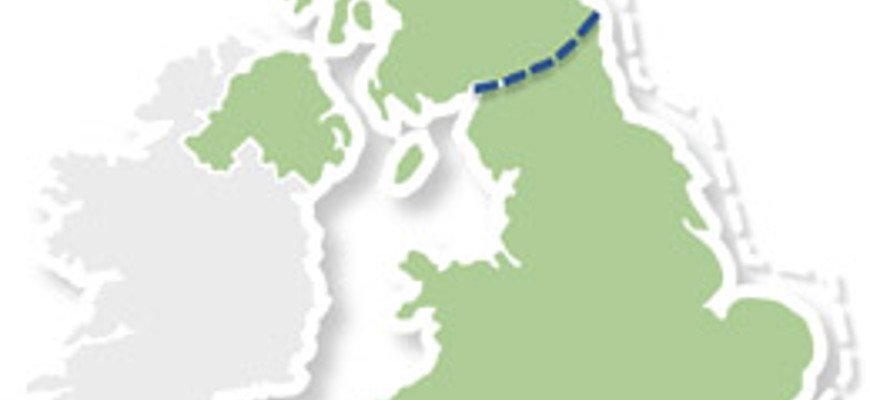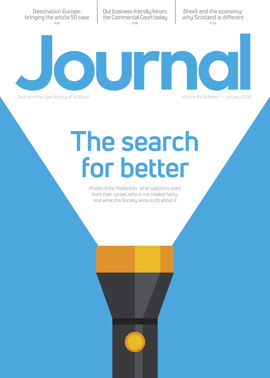Brexit north of the border

The UK is on track to leave the European Union in just over two months’ time. This will mark the most significant change to the UK economy in over 45 years. But more than two and a half years on from the referendum, much still remains unclear about what Brexit will actually entail.
But what about Scotland? How aligned are Scotland’s post-Brexit economic interests with those of the UK as a whole?
The economics of trade
Most economists will tell you that putting up barriers with your largest trading partner is harmful to long-term economic growth. The EU single market – home to more than 500 million potential consumers – provides an opportunity for Scottish businesses to access a much larger market than they can at home.
At the same time, there is a significant body of evidence that trade not only boosts the level of demand in an economy, but that it raises productivity by increasing competition and supporting the spread of new technologies, better management practices and international partnerships.
Scottish exports to the EU were worth nearly £13 billion in 2016. That’s more than we trade with North America, South America, Asia, the Middle East and Australasia combined. Our analysis suggests that this supports around 130,000 jobs across Scotland.
Interestingly, however, our international exports make up a smaller share of our economy than elsewhere. Indeed, in modelling work we undertook for the Scottish Parliament’s cross-party Europe Committee back in 2016, we estimated that any hit to the Scottish economy from reduced trade with the EU might be slightly smaller than for the UK as a whole.
But it is not just exports that could be impacted. Supply chains and inward investment flows are also likely to be disrupted.
Most analysis puts the potential risk to Scottish economic output at between 2% and 10% over the long run (i.e. 15 years or so), depending upon how “hard” the Brexit. It is important however, to put such numbers in context. Our economy will still grow; it will just do so more slowly than it would otherwise have done.
Where might Scotland’s interests differ?
Such analysis examines the economy-wide risks. But we also know that any impacts will vary significantly from sector to sector and from firm to firm. As a result, there are a number of areas where Scotland’s interests may differ quite significantly from the UK as a whole.
For example, only five of Scotland’s top 10 sectors for EU goods exports appear in the UK’s own list of top 10 EU exports. Whisky is ranked number 2 for Scotland but is only the 20th most important sector for the UK, while fisheries is third in Scotland but 33rd in the UK. Marrying up these different interests in future trade deals may not be straightforward.
Another area where Scotland’s interests differ significantly is with regard to migration. Both Scotland and the UK have aging populations. But the challenge is particularly pronounced in Scotland.
Indeed on current trends, our working age population is on track to fall over the next decade. This is not only an economic problem but also a fiscal one. An aging population increases the demand for public services, particularly in health and social care, but reduces the tax base to pay for them. We are already seeing a significant squeeze across the public sector as the NHS captures an ever-increasing share of Holyrood’s budget.
In recent years, Scotland’s economy has been boosted by in-migration from both the UK and the EU. Contrary to some misconceptions, EU migrants are on average younger, better skilled and more likely to be employed than the Scottish workforce as a whole. We also know that EU migrants play a crucial role in key sectors, including agriculture, tourism, and higher education. Reduced migration post-Brexit will have a disproportionate negative impact on Scotland.
Policymaking at risk
Of course, underpinning all of this are political debates. And here again, there are important differences between Scotland and the rest of the UK.
Relations between the Scottish and UK Parliaments have arguably never been at such a low ebb. Disagreements have raged over the transfer of powers from Brussels. Should they be returned to Holyrood or Westminster? We have also had the first instance in the history of devolution of the Scottish Parliament failing to consent to Westminster legislation that impacts on Holyrood.
Looking forward, it is hard to see relations improving. The Scottish Government has made the case for direct involvement in future UK trade negotiations, much like the Canadian provinces. So far this has been strongly rebuffed by the UK Government. It is not hard to envisage conflicts emerging when UK trade policy objectives cross over with devolved competencies.
Collaboration between both of Scotland’s governments is crucial for effective policymaking.
Independence revisited?
Of course, Brexit raises the prospects of a second independence referendum.
Back in 2014, there was a clear choice between a status quo and independence. Many will argue that this “status quo” looks more uncertain than before, particularly under a “hard Brexit”. Against that, some aspects of the independence case, such as oil revenues, look less strong than five years ago.
Those in favour of independence will argue that Scotland is prosperous and comparable in size to many other successful independent nations. They will also make the case that the levers of independence provide an opportunity to do things differently.
Those against will no doubt point out that recent events have highlighted – perhaps more clearly than ever before – that unpicking intricate and long-term trading, business and legal relationships is far from easy. Barriers with key markets have the potential to weaken growth prospects. For context, Scottish trade with the rest of the UK is around three and a half times greater than our trade with the EU.
At the same time, many of those on the “yes” side in 2014 were in favour of a degree of continuity between the then status quo and independence. This included plans to share sterling and to pool sovereignty in some areas of economic and fiscal policy. But if the case for independence now rests on an argument that Scotland can – and should – take a different path to a post-Brexit UK economy, then a future independence model might need to be more radical on issues such as currency. This of course brings its own challenges.
Brexit has highlighted the problems that can arise from not having a robust plan that addresses both the opportunities and the challenges from constitutional change. If we are to have a second independence referendum, the Scottish Government will need to avoid falling into the same trap.
Beyond Brexit: be prepared
One frustrating aspect of the last couple of years is that Brexit has crowded out almost all other discussions that we should be having about the future direction of our economy.
There is a real risk that important domestic policy issues are sidelined. At the same time, major global issues which will shape the future of our economy are being ignored.
Why is growth in Scotland still below trend? For all that Scotland is a rich and prosperous nation, why are nearly one in four children living in poverty?
Just last month, the Scottish Government announced plans to widen the wedge between Scottish and UK income tax rates. What might this mean for the future competitiveness of our economy?
And what are we doing to prepare ourselves for the major changes – such as climate change, automation and demographic change – that will shape our economy for decades to come?
While it is vitally important that businesses and their advisers prepare for Brexit and build their resilience to increased uncertainty, they must also reinforce their focus to shaping the long-term drivers of prosperity that are within their control, such as levels of innovation and skills and scoping out new markets and sources of efficiency. Our economy has been through major upheaval before. Yes, businesses will need to be resilient, but they will also need to show ambition and a willingness to respond positively to the opportunities that will undoubtedly exist in the years ahead.
About the Fraser of Allander Institute
For over 40 years, the Fraser of Allander Institute at the University of Strathclyde has been a leading independent research institute focused on the Scottish economy. Alongside its academic work, the FAI works in close partnership with businesses and governments to help them understand and respond to key economic challenges and opportunities.
Services include:
- commissioned economic research;
- bespoke briefing and analysis;
- continuous professional development and training;
- economic impact studies; surveys and insight.
In this issue
- Brexit: prepare for impact
- Continuity and compatibility
- The Disability Convention: clearing obstructions
- Policing review: the priorities
- Five investment practicalities for lawyers managing trusts
- Reading for pleasure
- Opinion: Aamer Anwar
- Book reviews
- Profile: Serena Sutherland
- President's column
- People on the move
- Lifting the lid on the law
- The article 50 case: how it happened
- Forum for business
- Relevant persons: an alternative
- Three ways to enhance digital innovation
- Brexit north of the border
- Roberton – a way forward?
- Interest that runs for years
- Minimum pricing: what next?
- A bill not as planned
- Consumer contracts, choice of law and time bar
- Entrepreneurs' relief: tightened too far?
- Scottish Solicitors' Discipline Tribunal
- In the name of justice
- Views from the bar
- Design the Journal front cover!
- Public policy highlights
- OPG update
- Police station interview training – an update
- Easier caution with Marsh online service
- Fantastic locums – and where to find them!
- Navigating competencies
- C1s – why they bounce
- Conference content?
- Turn on the black box
- Ask Ash






